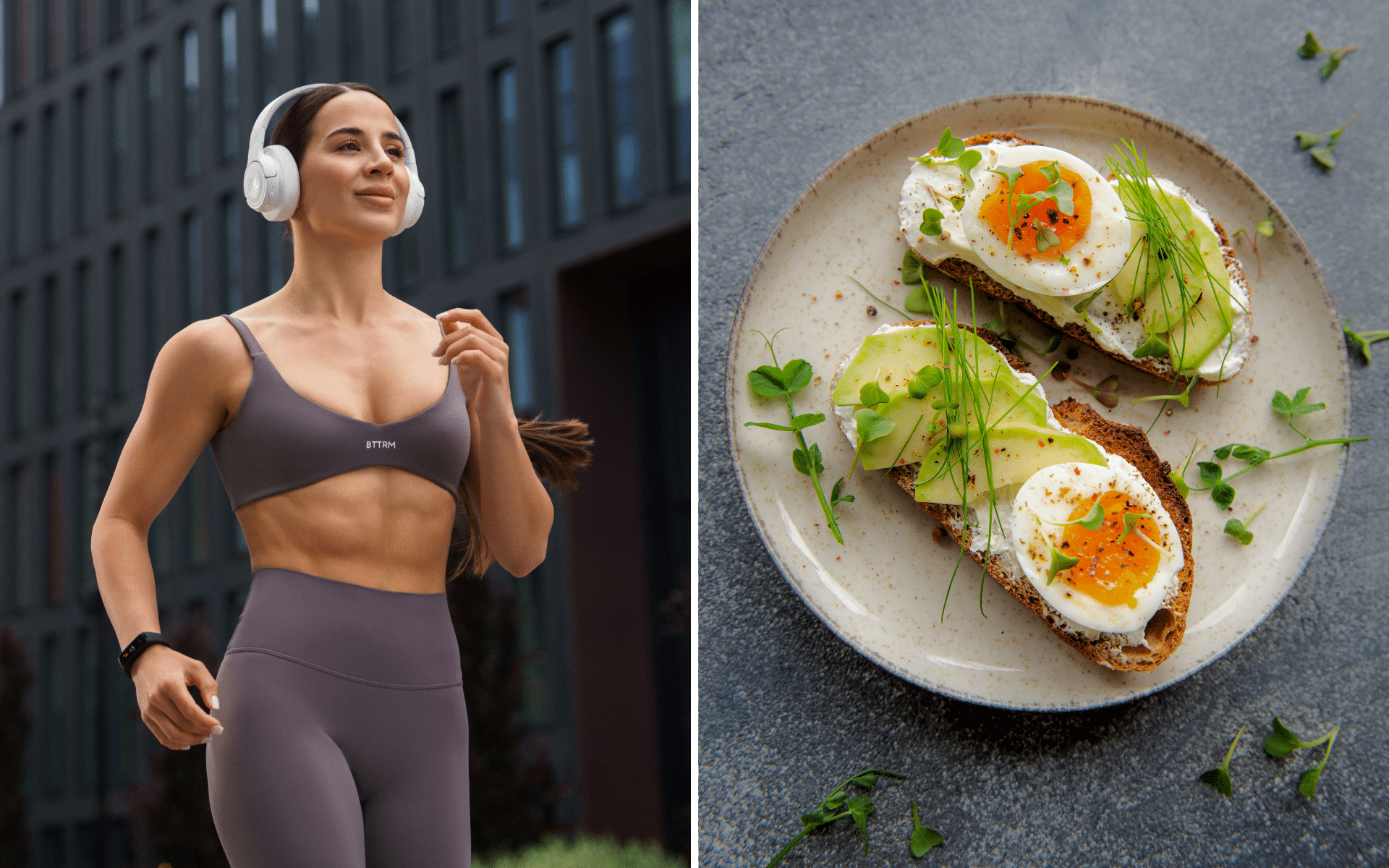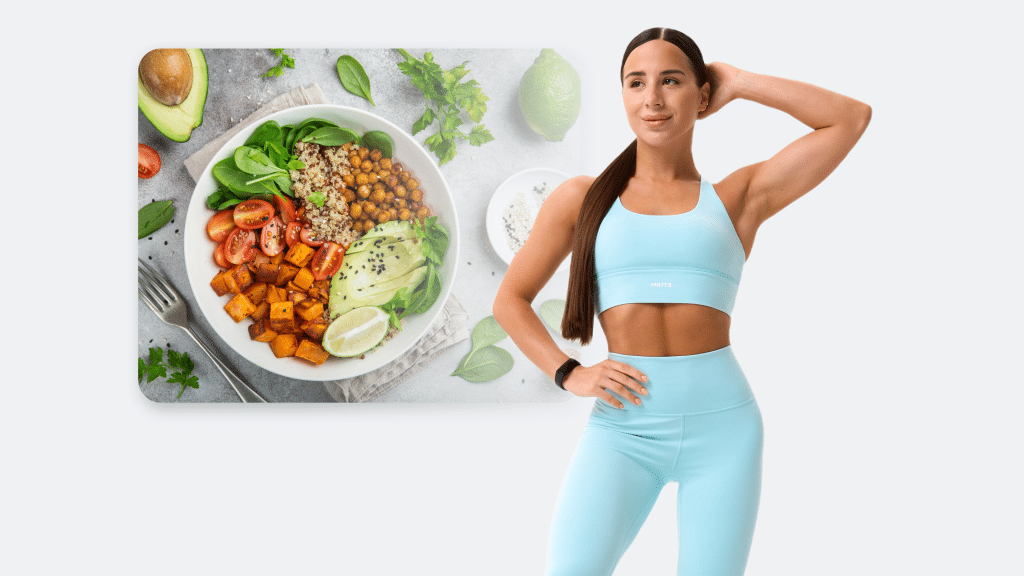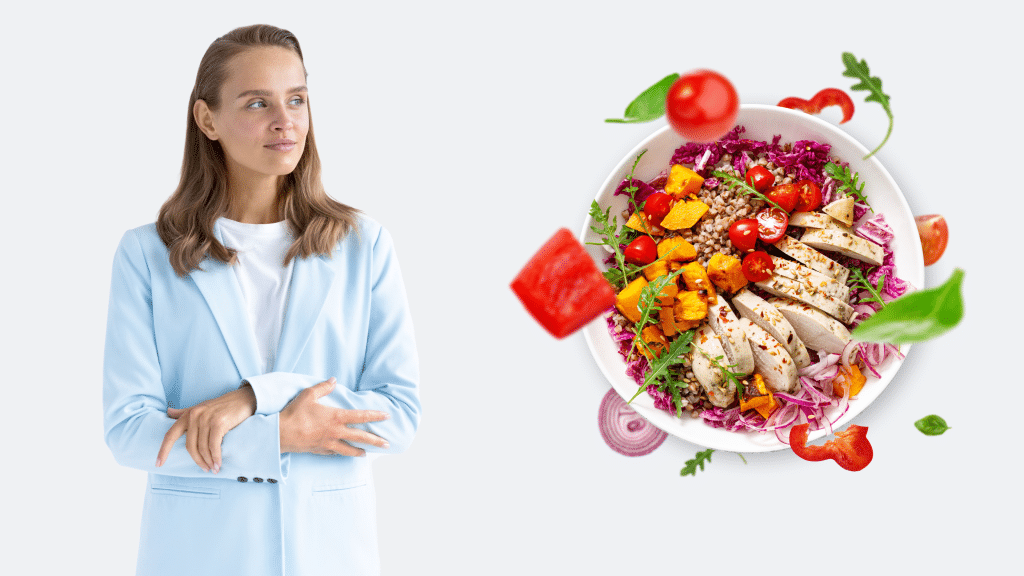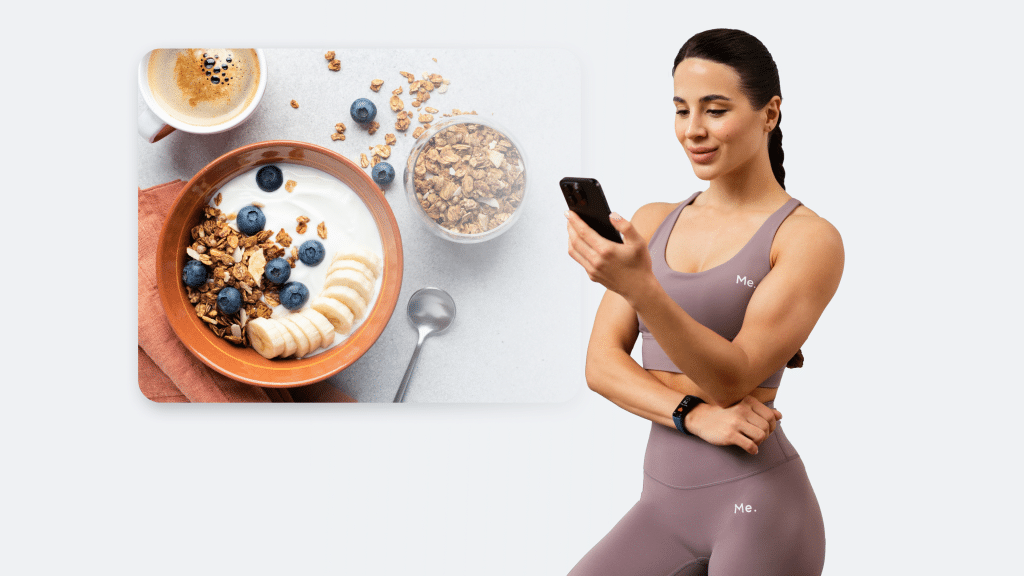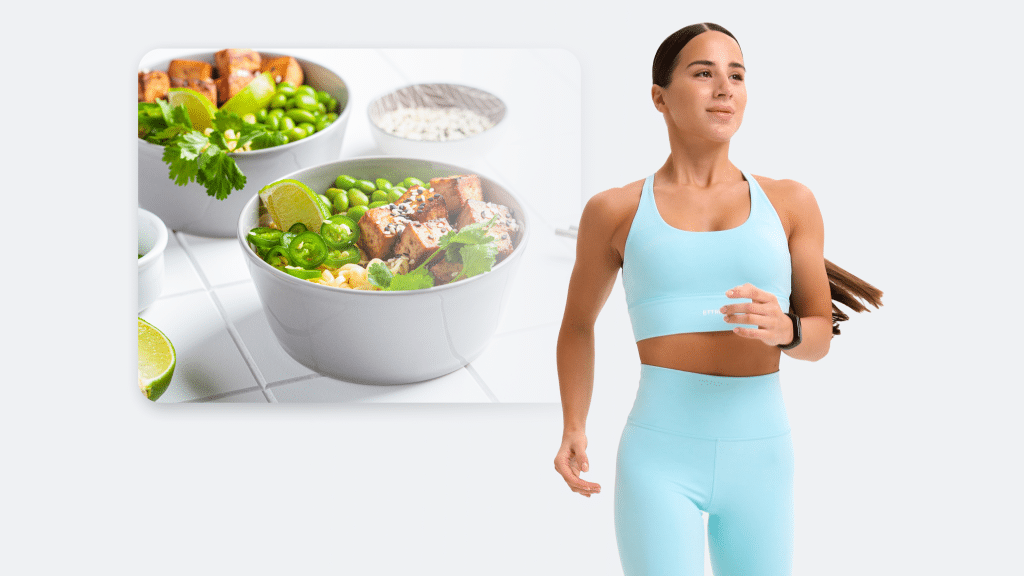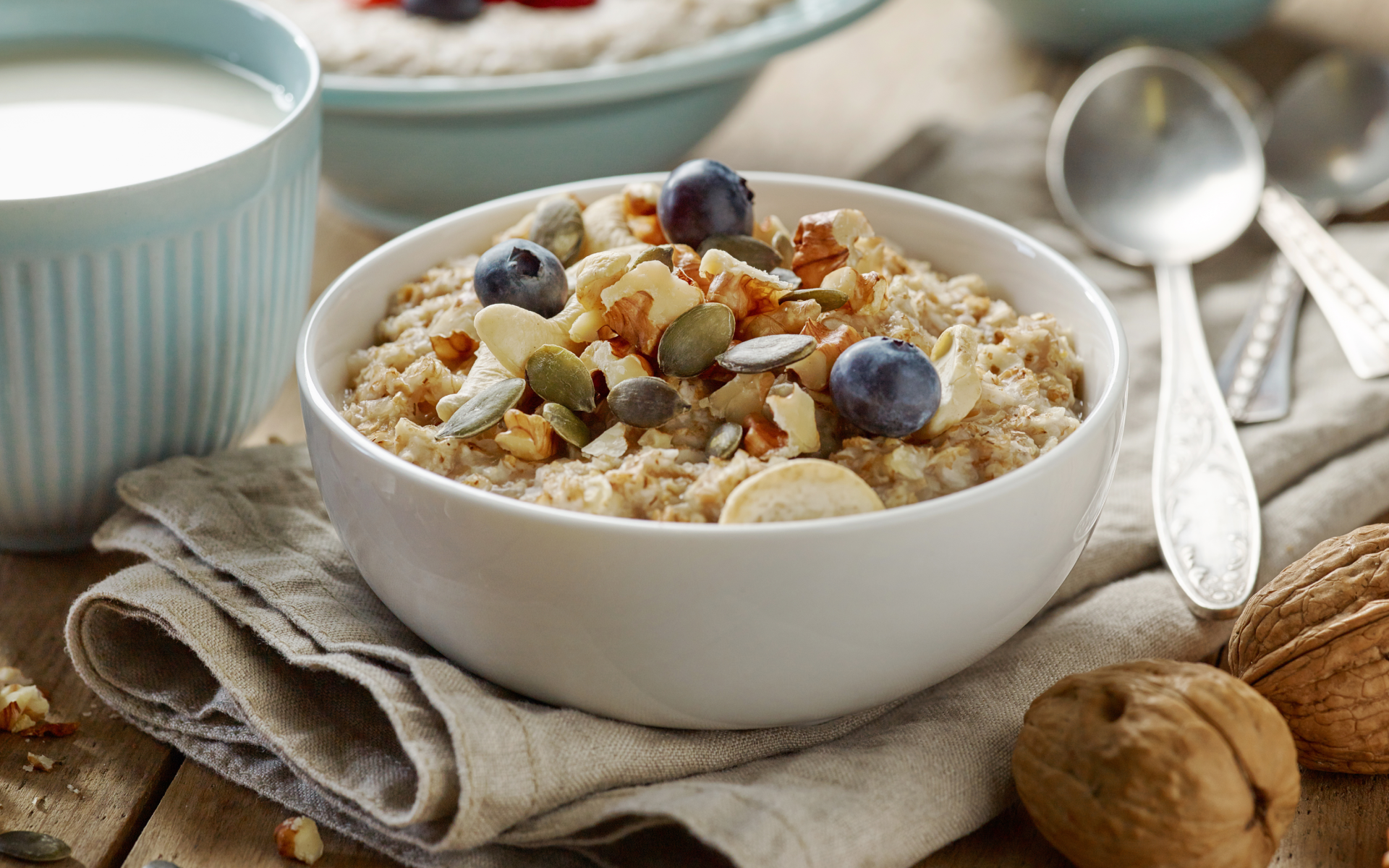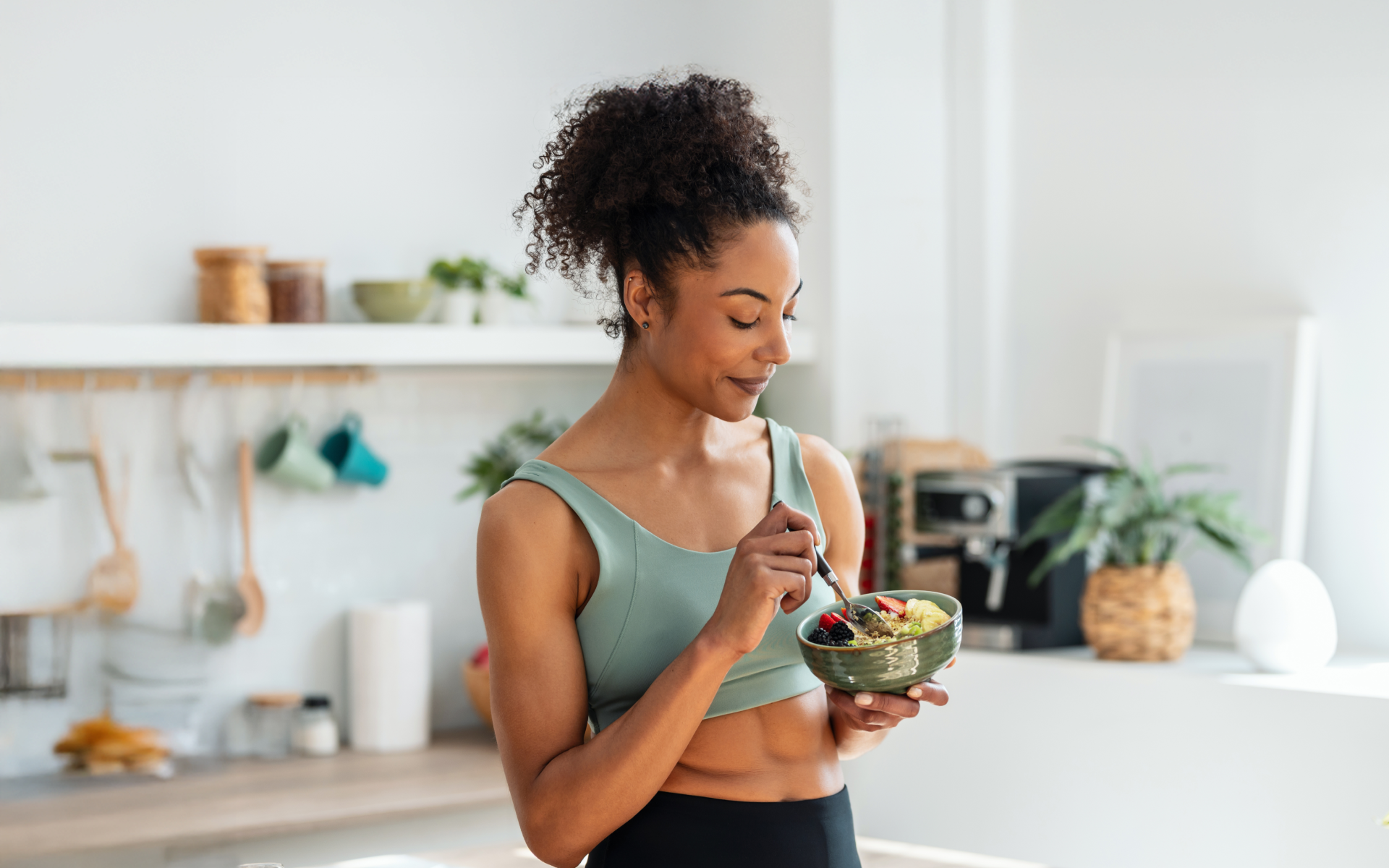Believe it or not, running is more than just physical fitness. It’s about fueling your body with the right nutrients to keep your legs pumping and your energy levels soaring. What you eat can make or break your performance, whether you’re a seasonal marathon runner or someone who jogs around the block every day. Just think of your body as a high-performing car. If it doesn’t get quality fuel, you won’t get very far (or get there very fast)!
You need a comprehensive plan to improve your on-field performance and help you feel a whole lot healthier and happier. This article could be the starting point to make that happen, but don’t worry – it isn’t your typical “eat more kale” advice. I’ve put together a 7-day meal plan that’s delicious and caters to runners’ needs. Ranging between protein-packed breakfasts and carb-loaded dinners (yes, pasta is on the menu), this plan can increase your strength, speed up recovery, and help you feel energized all week.
So, lace up those sneakers and join me as I reveal some saucy food combos to ace those laps!
What Is a 7-day Meal Plan for Runners?
As the name pretty much tells us, a 7-day meal plan for runners is designed to fuel runners through their training week. It emphasizes a balanced blend of lean proteins, complex carbohydrates, and healthy fats to support muscle recovery and energy levels (1). Proper hydration and nutrient-dense foods contribute to the enhanced performance of runners during training and competitions.
A runner’s meal plan typically covers meals and snacks that respond to the specific needs of individuals. For example, carbs support endurance. Protein can help repair your muscles, and vitamins/minerals help you feel strong, so you’re all set to hit the pavement (2).
What Do I Eat in a Week as a Runner?
Running takes a lot of energy. You may feel exhausted after a short run if you don’t have a balanced meal plan. However, before you start exploring your options, it’s important to know that there’s no one-size-fits-all solution for runners when it comes to diet plans. Every person’s caloric requirements rely on their height, weight, and other factors that influence energy expenditure (3).
Pro Tip: Runners should modify their calories when they stretch their mileage or increase their performance goals to complete their marathon training plans successfully.
What a runner eats in a week also depends on their dietary preferences. Let’s say you’re a vegetarian – then you must focus on foods that contain the right plant-based foods. Here’s a 7-day meal plan for vegetarian runners:
Day 1
- Breakfast: Oatmeal with chia seeds, almond butter, banana slices, and a drizzle of honey
- Snack: Greek yogurt with mixed berries
- Lunch: Quinoa salad with chickpeas, diced cucumber, cherry tomatoes, feta cheese, and a lemon-tahini dressing
- Snack: Apple slices with peanut butter
- Dinner: Lentil curry with brown rice and a side of sautéed spinach
- Post-Run Snack: Protein smoothie with almond milk, spinach, banana, and protein powder
Day 2
- Breakfast: Avocado toast with poached eggs and a sprinkle of pumpkin seeds
- Snack: Trail mix with almonds, walnuts, and dried cranberries
- Lunch: Black bean burrito bowl with brown rice, corn, salsa, and guacamole
- Snack: Hummus with carrot and celery sticks
- Dinner: Stir-fried tofu with mixed vegetables and quinoa
- Post-Run Snack: Cottage cheese with pineapple chunks
If you wish to free yourself from all the extra pounds that have been weighing you down for way too long, start using the BetterMe: Health Coaching app and overhaul your entire life!
Day 3
- Breakfast: Smoothie bowl with spinach, frozen berries, chia seeds, and granola
- Snack: Banana and a handful of mixed nuts
- Lunch: Caprese salad with tomatoes, mozzarella, basil, and balsamic glaze, served with whole grain bread
- Snack: Edamame with a sprinkle of sea salt
- Dinner: Sweet potato and black bean chili topped with avocado and cilantro
- Post-Run Snack: Chocolate milk or a protein bar
Day 4
- Breakfast: Greek yogurt parfait with granola, honey, and sliced strawberries
- Snack: A pear with a handful of cashews
- Lunch: Falafel wrap with hummus, shredded lettuce, tomatoes, and cucumber
- Snack: Whole-grain crackers with cheese
- Dinner: Mushroom risotto with a side salad of arugula and cherry tomatoes
- Post-Run Snack: Protein shake with almond milk and peanut butter
Day 5
- Breakfast: Whole-grain pancakes topped with Greek yogurt, fresh berries, and a drizzle of maple syrup
- Snack: Protein smoothie with oats, banana, and almond butter
- Lunch: Spinach and feta cheese stuffed whole-grain pita with tzatziki sauce
- Snack: Baby carrots with hummus
- Dinner: Vegan lentil bolognese with whole-grain pasta and a side of roasted broccoli
- Post-Run Snack: Almond milk with granola
Day 6
- Breakfast: Chia pudding made with almond milk, topped with mango chunks and coconut flakes
- Snack: Fresh orange and a handful of almonds
- Lunch: Buddha bowl with brown rice, roasted chickpeas, avocado, red cabbage, and tahini dressing
- Snack: Smoothie made with spinach, apple, and ginger
- Dinner: Vegetarian pad Thai with tofu, peanuts, bean sprouts, and lime wedges
- Post-Run Snack: Greek yogurt with a drizzle of honey
Day 7
- Breakfast: Scrambled tofu with spinach, tomatoes, bell peppers, and whole-grain toast
- Snack: Protein balls made with oats, dates, and almond butter
- Lunch: Margherita pizza on a whole-wheat crust with a side of mixed greens salad
- Snack: Sliced cucumber with hummus
- Dinner: Vegetable stir-fry with soba noodles and a sesame-ginger sauce
- Post-Run Snack: Cottage cheese with a handful of blueberries
This is a meal plan that contains the necessary food groups. It has whole foods that are rich in fiber, protein, and essential vitamins.
Read more: 4-Week Running Plan to Lose Weight
What Is the Best Meal for Runners?
The main food groups that should make it onto every runner’s meal plan are:
Macronutrients
Different macronutrient ratios work differently for every person. As per the Institute of Medicine, everyone should aim to eat (4):
- 45-65% carbohydrates
- 20-35% fats
- 10-35% proteins
Your specific targets within these ranges may vary based on personal requirements and preferences. For example, runners may want to aim toward the higher end of carbohydrates to fuel their runs. More generally, they should also eat enough calories to sustain their training programs. According to the experts, your caloric needs depend on the following factors (5):
- Body composition
- Daily physical activity
- Resting metabolic rate
- Running conditions
- Specific training demands
It also goes without saying that the more mileage a person runs, the higher their caloric needs will be.
Micronutrients
Your body uses these minerals and vitamins to conduct life-sustaining biological functions. Those with a balanced diet containing fruits and vegetables can easily get the necessary micronutrients. These are particularly important for athletes. Engaging in excessive training can put the body in an immunocompromised or inflammatory state (6). This may make a person feel sick and prone to quit.
A 2000 study highlighted that beyond just meeting calorie needs, getting sufficient micronutrients can help reduce the inflammatory impact of training (7).
Although most people can obtain these essential micronutrients from their diets, individuals with dietary restrictions may be at risk of deficiencies. A 2019 study suggested that those who adhere to vegetarian or vegan diets may require extra dietary planning or supplements such as vitamin B12, vitamin D, and iron (8). You should talk to your healthcare provider or a registered dietitian to get individualized advice.
Proteins, Carbs, and Fats
These are the three macronutrients that are required by runners to stay fit and healthy. Although individual needs vary, most runners should focus on getting a variety of foods from all food groups, which will meet most people’s needs.
According to the Dietary Guidelines for Americans, protein should comprise 10-35% of daily energy, fat should comprise 20-35%, and carbohydrates should contribute 45-65%.
Proteins
Proteins help build and repair muscles. This means eating enough protein is necessary to help with muscle recovery after an exercise session.
A small 2017 study of elite runners found that adding whey protein to their diets helped reduce injuries and improve endurance (9). However, recreational runners typically get sufficient protein from their regular diets.
Focusing on a protein-rich meal or snack after running can be beneficial. According to 2008 research on consuming carbohydrates and protein, post-workout supports glycogen storage, enhancing muscle recovery (10).
Some healthy protein sources include:
- Eggs
- Beans, lentils, and other legumes
- Soy products
- Fish (rich in omega-3)
- Lean meats and poultry
- Dairy
The BetterMe: Health Coaching app will provide you with a host of fat-frying fitness routines that’ll scare the extra pounds away and turn your body into a masterpiece! Get your life moving in the right direction with BetterMe!
Carbs are the most accessible form of energy that can easily be used during runs. A 2008 study involving elite runners found that most consumed 50–70% of their daily caloric intake from carbohydrates (11). Runners who trained at higher intensities and covered longer distances required even more carbs.
Although most recreational runners aren’t logging 100 miles or more per week like elite athletes, they still need to prioritize sufficient carbohydrate intake. Consuming too few carbs can lead to sluggish performance, inadequate recovery, increased risk of injury, and symptoms of overtraining.
As per the American Heart Association, some popular sources of carbs for runners are (12):
- Whole grains (including cereal, pasta, and bread made from whole grains)
- Sweet potatoes and other starchy vegetables
- Whole fruits
- Legumes
Some runners may reduce their fiber intakes at certain times due to gastrointestinal issues. This could mean they eat a low-carb diet before their runs to avoid discomfort. Still, the amount of fiber the gut can tolerate varies from person to person. This may compel them to experiment with different strategies until they figure out what works.
Fats
Fats are an important part of a balanced diet and play a primary role in nerve function.
A review in 2018 suggested that athletes who run or swim may benefit from more fat in their diets (13). They may notice enhanced endurance and better performance when they include healthy fats in their diets.
Some healthy sources of poly- and monounsaturated fats are:
- Olives
- Avocados
- Sesame, peanut, canola oil
- Nuts
- Walnuts
- Corn, soybean oils, sunflower
- Pumpkin and sunflower seeds
- Fatty fish like tuna and salmon
If you’re serious about running, planning your meals may take some time. There’s always an option to seek professional help to get your hands on a solid diet plan. This may include instructions on how to stretch before running, how to time your meals, and the alternatives if certain foods aren’t readily available.
What Foods Are Good for Runners to Eat to Lose Weight?
Some people may start running because they want to lose weight. The right running program may help build muscles, increase metabolism, and lose weight if you’re careful about caloric consumption.
According to Denver-based runner and registered dietitian nutritionist Jessica Crandall Snyder, many runners overestimate the calories they burn during workouts, which often leads to overeating and, ultimately, weight gain instead of loss. It’s helpful to accurately estimate your energy needs and set your calorie intake targets based on your goals.
A meal plan for runners to lose weight may include the following foods:
- Avocados
Avocados are an excellent post-run refueling option. In addition to being rich in heart-healthy mono- and polyunsaturated fats, avocados can help with weight management. Research from the British Journal of Nutrition found higher avocado consumption to be associated with lower body weight and waist circumference (14).
- Water
Water is essential for weight loss, even though it’s not food. A decrease in body mass of 1-2% due to dehydration can reduce performance (15). Lower performance means fewer calories burned and less muscle development. To ensure proper hydration, drink plenty of water throughout the day, including before and after your run.
- Eggs
Eggs are a runner’s ideal snack due to their high protein content. This is particularly beneficial for those who are looking to lose weight, as more protein at breakfast can help. Some studies have suggested that spreading protein intake throughout the day rather than consuming it all at dinner is important for maximizing the benefits of protein (16).
- Frozen Berries
As a runner, it’s important to understand “oxidative damage”, which occurs when your body uses oxygen to break down food for energy, such as during a run. Balancing the workout stress with antioxidants is essential. Berries are one of the best weight-loss-friendly sources of antioxidants. Frozen berries are an excellent option when they aren’t in season. Research from the University of Chester found that frozen fruits and vegetables tend to contain similar amounts of vitamins and minerals to fresh ones (17).
- Lean Meats
In addition to protein, meat stands out due to its high iron content. Iron is essential for delivering oxygen to your muscles. Without enough of it, your workouts and overall health can suffer. Lean cuts of beef such as sirloin and fillet are great beef choices for those who are trying to lose weight. When buying ground meat, choose varieties that are 90% lean or more, which will be clearly labeled on the packaging. If you prefer to eat less red meat, then fish and poultry are also excellent sources of iron.
You’ll find many other food options in your running diet plan. Just ensure it considers all your individual needs and preferences. As previously mentioned, the dietary requirements for runners may vary. For example, the foods you enjoy or what is readily available to you may be different than for another runner. Therefore, you should consider all such factors before curating a dietary schedule for yourself.
Read more: Beginner Running Plan for Weight Loss and Ultimate Confidence
Is It Better to Run on an Empty Stomach?
Running in a fasting state can create problems. It’s better to eat before running to give your body the fuel it needs. However, if you do those laps on an empty stomach, you should take the right measures to avoid risks.
- Opt for light-to-moderate running
- Stay hydrated
- Get a healthy and fulfilling breakfast afterward
- Take a break if you feel lightheaded
Despite the challenges, some experts strongly advocate running on an empty stomach. They believe in the theory that exercise before eating leads to the burning of more stored fats (18). In either case, going for a morning run, particularly before a busy day, is an excellent way to lift your mood and boost your energy. It gives you a positive start and leaves you feeling accomplished and happy as you start your day.
What Happens If You Run and Don’t Eat?
Running without eating properly may negatively affect your body. It can affect your performance, creating a significant dip in it. The low energy levels could make you feel tired earlier than usual. Your body is reliant on glycogen (stored carbohydrates) for quick energy during exercise. Without fuel, these stores can quickly deplete. This may cause you to feel sluggish, lightheaded, or even dizzy during your run.
Not eating enough can increase muscle breakdown, as your body may use muscle protein for energy. This can lead to muscle loss and hinder recovery over time. To get the most out of your workouts and protect your muscles, eating a light snack or meal that is rich in carbs and protein is crucial before you hit the pavement.
The 50-25-25 meal plan is a portion control strategy that divides your plate into three parts: Also called the “Diabetes Portion Plate”, this method helps manage blood sugar and creates balanced meals (19). Drinking coffee or any caffeine before a run can boost your energy and make your workout less uncomfortable. Many long-distance runners, cyclists, and triathletes use caffeine supplements to enhance their performance on race days. Caffeine can affect people differently though, so do whatever is right for you. Morning workouts may be great for some people, but afternoon or evening exercise has its own health and fitness perks. So, if you’re not a morning person, no worries—night owls can still reap plenty of benefits! What’s important is that you do the exercise, so choose a time that works best for you. This depends on your fitness levels, goals, and other individual factors. Some people aim for one long run and 2-4 shorter runs on alternating days. Your long run should be 1.5 to 2 times longer than a short run or about 20-30% of your total weekly mileage. Short runs should be around 20-30 minutes, potentially covering approximately 2-4 miles each time.Frequently Asked Questions
What is the 50-25-25 meal plan?
Should you drink coffee before a run?
Is it better to run in the morning or at night?
How long should a run be?
The Bottom Line
Who would have thought that a simple exercise such as running relies on nourishment for better performance?
A growing body of research suggests that athletic and even leisure runs should be fueled with the right diet plan. This should balance proteins, carbs, healthy fats, and micronutrients from a variety of foods. Testing your pre-race meal and snack during training is super important. That’s why this 7-day meal plan features similar breakfasts on those tough intervals, tempo, and long run days, just like you’ll eat on race day.
Be mindful of your dietary preferences. Just because something works for your friend doesn’t mean it will suit you too. You should consult a registered dietitian to get guidance and a custom meal plan.
DISCLAIMER:
This article is intended for general informational purposes only and does not serve to address individual circumstances. It is not a substitute for professional advice or help and should not be relied on for making any kind of decision-making. Any action taken as a direct or indirect result of the information in this article is entirely at your own risk and is your sole responsibility.
BetterMe, its content staff, and its medical advisors accept no responsibility for inaccuracies, errors, misstatements, inconsistencies, or omissions and specifically disclaim any liability, loss or risk, personal, professional or otherwise, which may be incurred as a consequence, directly or indirectly, of the use and/or application of any content.
You should always seek the advice of your physician or other qualified health provider with any questions you may have regarding a medical condition or your specific situation. Never disregard professional medical advice or delay seeking it because of BetterMe content. If you suspect or think you may have a medical emergency, call your doctor.
SOURCES:
- Popular Dietary Trends’ Impact on Athletic Performance: A Critical Analysis Review (2023, pmc.ncbi.nlm.nih.gov)
- The effects of protein supplements on muscle mass, strength, and aerobic and anaerobic power in healthy adults: a systematic review (2015, pubmed.ncbi.nlm.nih.gov)
- Calories: Total Macronutrient Intake, Energy Expenditure, and Net Energy Stores (1989, ncbi.nlm.nih.gov)
- Exercise and the Institute of Medicine recommendations for nutrition (2005, pubmed.ncbi.nlm.nih.gov)
- International Journal of Behavioral Nutrition and Physical Activity (2024, ijbnpa.biomedcentral.com)
- Effects of Exercise on Immune Function (2015, gssiweb.org)
- Elite athlete immunology: importance of nutrition (2000, pubmed.ncbi.nlm.nih.gov)
- Micronutrient Status of Recreational Runners with Vegetarian or Non-Vegetarian Dietary Patterns (2019, pmc.ncbi.nlm.nih.gov)
- Whey Protein Improves Marathon-Induced Injury and Exercise Performance in Elite Track Runners (2017, pmc.ncbi.nlm.nih.gov)
- Nutrition Concepts for Elite Distance Runners Based on Macronutrient and Energy Expenditure (2008, pmc.ncbi.nlm.nih.gov)
- Carbohydrates (2023, heart.org)
- Nutrition in Ultra-Endurance: State of the Art (2018, pmc.ncbi.nlm.nih.gov)
- Consumption of avocado and associations with nutrient, food and anthropometric measures in a representative survey of Australians: a secondary analysis of the 2011–2012 National Nutrition and Physical Activity Survey (2021, cambridge.org)
- Hydration, drinking and exercise performance (2019, sems-journal.ch)
- Protein ‘requirements’ beyond the RDA: implications for optimizing health. (2016, tspace.library.utoronto.ca)
- Nutritional comparison of cooked fresh and frozen vegetables (2024, chesterrep.openrepository.com)
- Exercising Before Eating Burns More Fat: Study (2019, the-scientist.com)
- Plates and Dietar Plates and Dietary Advice: A Curry Advice: A Current Trend in Nutrition Education Messaging for the Public (2014, digitalcommons.unf.edu)
